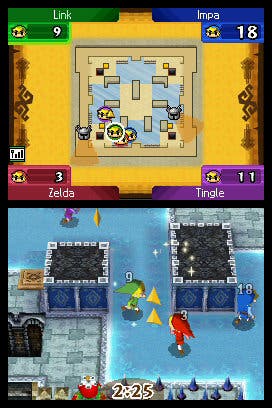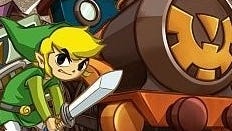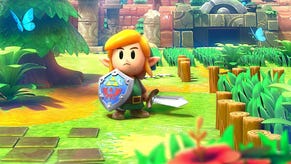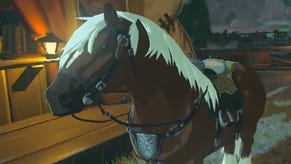Games of 2009: The Legend of Zelda: Spirit Tracks
Souls survivor.
Link has traditionally been a lonely and rather troubled hero - see the orphaned Link of Ocarina of Time and Majora's Mask, a child with a man's experience and the weight of the world on his shoulders - but since Wind Waker he's had increasingly personable companions to aid him in saving the world. In Spirit Tracks, it's Zelda herself, channelling the feistiness and spirit of Wind Waker's Tetra, her distant ancestor. Their relationship infuses the whole game with banter and innocent romance, even if Link is, as always, mute. Spirit Tracks is a funny game, well-written and superbly animated, with an eye for physical comedy too. There's not a touch of darkness about it.
Zelda brings new gameplay with her as well, in the form of two-character puzzles, but it's the train that brings the most memorable new experiences to the series. It looks like a wooden toy, big and blocky, and it's almost as fun to play with as a wooden toy too as it chuffs and squeals delightfully around the landscape. I found myself absent-mindedly going "chuffachuffachuffachuffa" under my breath whilst playing Spirit Tracks on my own the other day, and I grin like an idiot every time I pull the whistle or adjust a level to change direction.
There's something about the DS that really suits Zelda. We could already see that in Phantom Hourglass, but Spirit Tracks is the better game - it's just better designed, and doesn't force you to repeat its central dungeon every time you make progress, which forced me to give up on Phantom Hourglass in the end. (Strange that I should take such exception to repeating myself in that context when I've essentially been repeating myself every time I've played a Zelda game over the past decade, but there you go.)

Making notes on the map - which remain there hours and hours later when you stop by an old location to collect a stamp or deliver a passenger, reminding you of a previous 'eureka!' moment and prompting a smile - is a stroke of genius, and the touch-screen makes it effortless to control. The tactile nature of it makes old toys like the boomerang fun all over again, and provides great inspiration for new ones, like the train itself.
Wind Waker marked a turning point in the Zelda series for me. It promised reinvention, renewal, a new baptism for Hyrule, a promise that Twilight Princess went back on. For all its accomplishments, it wasn't much of a new Zelda. It embraced the darker, slightly abstract tone and style of Ocarina, as well as the light-dark dichotomy at the heart of several of its predecessors, and though all of that was elegant and affecting, it wasn't inspiring. Phantom Hourglass and Spirit Tracks are Wind Waker's true successors - they're gleeful, young at heart, and they inspire that in their players, too, whatever their age.
I know I've done this before. I know I've essentially been playing this game once every few years since I was seven. But I'm not bored of it, and for as long as Nintendo keeps infusing this series with such warmth and inventive spark, it's impossible to feel anything other than charmed by it. Woo wooooooo!
Check out the Editor's blog to find out more about our Games of 2009.





